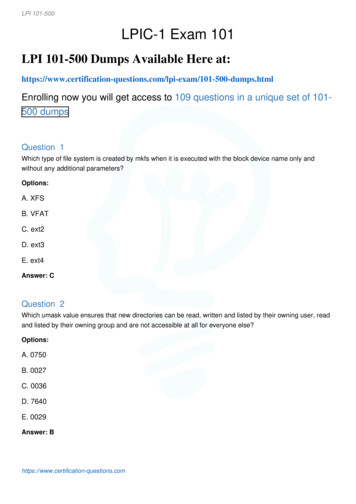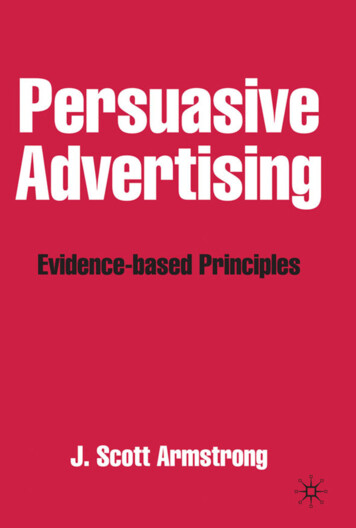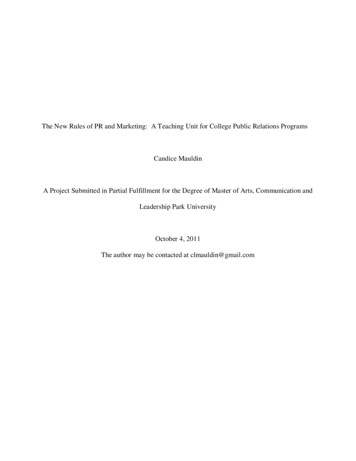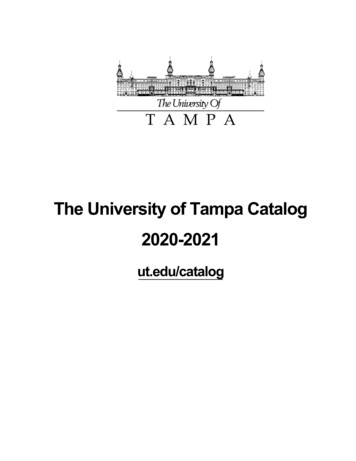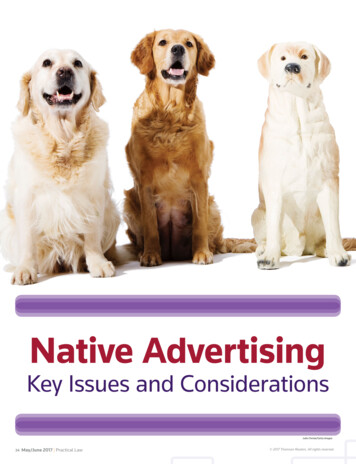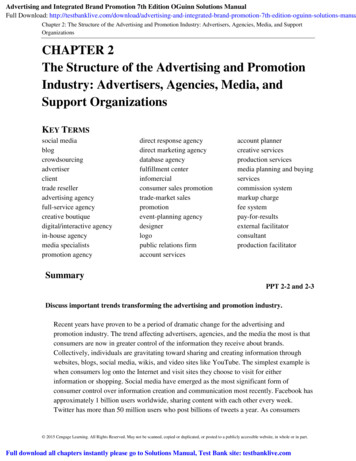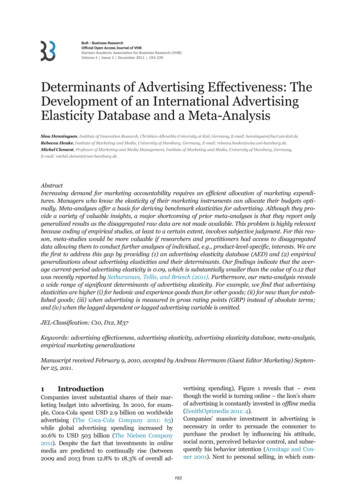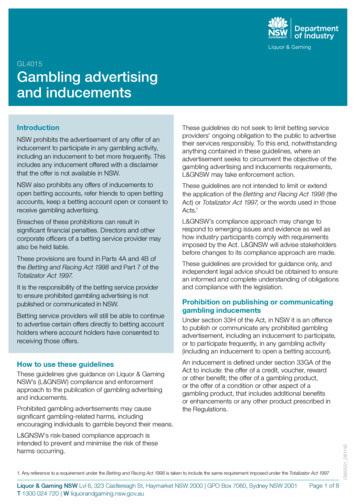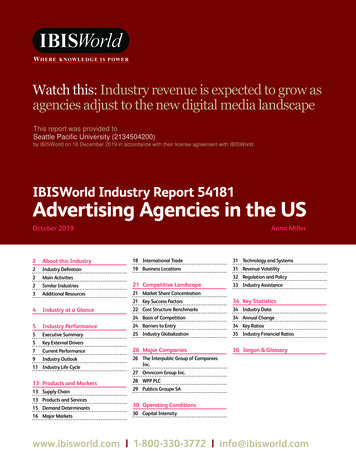
Transcription
Presenting a live 110‐minute teleconference with interactive Q&ADirect Mail Advertising and Sales Tax Challenges:Navigating Differing State PoliciesTracking and Managing Exemption, Nexus, Sourcing, Use Tax and Other Related IssuesTHURSDAY, JULY 28, 20111pm Eastern 12pm Central 11am Mountain 10am PacificToday’s faculty features:Don Fuga,Fuga Principal Tax Research Analyst,Analyst Vertex Inc.,Inc. Berwyn,Berwyn PaPa.Joseph Geiger, Senior Tax Consultant, Vertex Inc., Berwyn, Pa.Martin Eisenstein, Member, Brann & Isaacson, Lewiston, MaineFor this program, attendees must listen to the audio over the telephone.Please refer to the instructions emailed to the registrant for the dial-in information.Attendees can still view the presentation slides online. If you have any questions, pleasecontact Customer Service at1-800-926-7926 ext. 10.
Conference MaterialsIf you have not printed the conference materials for this program, pleasecomplete the following steps: Click on the sign next to “Conference Materials” in the middle of the lefthand column on your screen.screen Click on the tab labeled “Handouts” that appears, and there you will see aPDF of the slides for today's program. Double click on the PDF and a separate page will open. Print the slides by clicking on the printer icon.
Continuing Education CreditsFOR LIVE EVENT ONLYAttendees must listen to the audio over the telephone. Attendees can still viewthe presentation slides online but there is no online audio for this program.Attendees must stay on the line for at least 100 minutes in order to qualify fora full 2 credits of CPE. Attendance is monitored as required by NASBA.Please refer to the instructions emailed to the registrant for additionalinformation. If you have any questions, please contact Customer Serviceat 11-800-926-7926800 926 7926 ext. 10.
Tips for Optimal QualitySSoundd QualityQ litFor this program, you must listen via the telephone by dialing 1-866-258-2056and entering your PIN when prompted. There will be no sound over the webco ect o .connection.If you dialed in and have any difficulties during the call, press *0 for assistance.You may also send us a chat or e-mail sound@straffordpub.com immediately sowe can address the problem.Viewing QualityTo maximize your screen, press the F11 key on your keyboard. To exit full screen,press the F11 key again.again
Direct Mail Advertising and Sales TaxCh llChallenges:NavigatingN i ti DifferingDiff i StateSt tPolicies SeminarJuly 28, 2011Don Fuga, Vertex Inc.don.fuga@vertexinc.comMartin Eisenstein, Brann & Isaacsonmeisenstein@brannlaw.comJoseph Geiger, Vertex Inc.joseph.geiger@vertexinc.com
Today’s ProgramIntroductory Concepts[Don Fuga]Slide 7 – Slide 14Examples Of Specific State Treatments[Joseph Geiger]Slide 15 – Slide 31Nexus Issues[Martin Eisenstein]Slide 32 – Slide 41Printer's Liability To Charge Tax[Martin Eisenstein]Slide 42 – Slide 51How SSTP Treats Certificates Printers May Need[Don Fuga]Slide 52 – Slide 53
Don Fuga, Vertex Inc.INTRODUCTORY CONCEPTS
Definition SSUTA Agreement “Direct mail” means printed material delivered or distributed by U.S.mail or other deliveryy service to a mass audience or to addressees ona mailing list provided by the purchaser or at the direction of thepurchaser, when the cost of the items are not billed directly to therecipients. “Direct mail” includes tangible personal property supplieddirectly or indirectly by the purchaser to the direct mail seller forinclusion in the package containing the printed material. “Direct mail”does not include multiple items of printed material delivered to a singleaddress.dd8
Definition Qualifiers That Broaden Scope Included in the definition is the term “advertising materials,” examplesof which include the following: Video and audio tapes Pens Key rings Computer disks Coffee mugs9
Definition Qualifiers That Limit Scope Examples of qualifiers that limit scope include the following: Method of delivery limited to the U.S. Postal Service Specify only limited printed materials (e(e.g.,g include or excludecatalogs) Exclude advertising materials Limit printed matter content to price and item Limit to free publications published on a regular basis Exclude multiple items of printed matter Limit exemption to cooperatives10
Examples Of Printed Material That Qualify The following items are generally considered to qualify but some maybe excluded in certain jurisdictions: MailM il orderd catalogst l Advertising circulars Coupons Advertising folders Printed envelopes Electoral literature Newspaper inserts One-time license fee for a mailing list11
Examples Of Items That May Not Qualify The following items are generally not considered to qualify, but somemay in certain jurisdictions: Advertisingg materials ((unless allowed byy definition)) Stockholder reports Personalized information Legally required mailings Privacy notices Informal informational literature that is not in the form ofadvertisingd ti i12
Typical Tax Issues For Taxpayers Does the advertising printed matter or materials qualify for anexemption and if so, in which jurisdictions? Is ppostageg exemptp and if so, in which jjurisdictions? Does the printer have the ability to charge the appropriate tax whereapplicable? Does my IT system have the ability to accrue the correct use tax whenthe printer fails to charge the appropriate tax? What is the correct exemption certificate to issue the printer, whereapplicable? Are there storage issues with direct mail advertising literature ormaterials? Are my records adequate to sustain exempt transactions?13
Typical Tax Issues For Printers Does my IT system have the ability to charge the appropriate tax? Does the mailing list received from my customer contain informationneeded to comply with sourcing rules? What exemption certificates are acceptable? Are there storage issues with direct mail literature?14
Joseph Geiger, Vertex Inc.EXAMPLES OF SPECIFIC STATETREATMENTS
Defining Direct Mail Advertising “Direct mail advertising” includes catalogs, letters, circulars, brochures,and ppamphletspthat consist of pprinted sales messagesg if the advertisinggmaterial is printed to the purchaser’s special order; delivered by theseller, the seller’s agent or a mailing house acting as the purchaser’sagent, via mail or common carrier; and received by any other personwho becomes the owner of the material at no cost to the recipient.16
Taxability Of Direct Mail Advertising Direct mail advertising is taxable in most states. Direct mail advertising is generally not taxable in the following states: CA MO NY OH PA17
California An exemption exists for the gross receipts from the sale of, and thestorage,g , use,, or other consumptionpin California of catalogs,g , letters,,circulars, brochures, and pamphlets that consist substantially of printedsales messages for goods and services and are printed to the specialorder of the purchaser and mailed or delivered by the seller, the seller'sagent, or a mailing house, acting as an agent for the purchaser,through the U.S. Postal Service or by common carrier to any otherperson at no cost to that person who becomes the owner of suchprintedi t d salesl messages. (S(Sec. 63796379.5,5 RRev. & TTax CCode)d )18
Florida Exempt are free,free circulated publicationspublications, the content of which isprimarily advertising, that are published on a regular basis anddistributed through the mail. (Fla. Stat. Sec. 212.08(7)(w))19
Iowa Envelopes used to contain advertising materials are exempt. (Rule701-18.41 (422, 423))20
Kentucky Effective July 1, 2011, commercial printers or mailers engaged inbusiness in Kentucky are not required to collect use tax on sales ofprinting, "advertising and promotional direct mail," or "other direct mail"printed outside Kentucky and delivered outside Kentucky to the U.S.Postal Service for mass mailing to third-party Kentucky residents whoare not purchasers of the mail if the commercial printers or mailers (1)maintaini t i recordsd relatedl t d tto ththose salesl tto assisti t ththe KKentuckyt kDepartment of Revenue in the collection of use tax, and (2) file salesand use tax reports if requested to do so by the department. (KRS Sec.139 365(1)) If a commercial printer or mailer meets these two criteria139.365(1))criteria,the purchaser of the printing or mail is solely responsible for reportingand paying use tax. (KRS Sec. 139.365(2))21
Louisiana Catalog distribution exemption: No sales or use tax shall be imposedby the state or any political subdivision on the value of catalogsdistributed, or intended for distribution in the state, without charge tothe recipient.p((La. Rev. Stat. Sec. 47:305.49))22
Maryland Charges for printing direct marketing materials are taxable. Taxapplies to the total charge without deduction for separately itemizedcharges for property or services required to bring the printed matter toits completed state. (Sec. 11-101(m), Tax Gen. Art.; Reg.03.06.01.11(A)) Sales of direct mail advertising literature and mail order cataloguesthat will be distributed outside the state are exempt. Sales ofcomputerized mailing lists are also exempt to the extent used for thepurpose of providing addresses to which direct mail advertisingliterature and mail order catalogues will be distributed outside the state.(Sec 11-215(d)(1)(Sec.11 215(d)(1), Tax Gen.Gen Art.)Art )23
Minnesota Non-taxable advertising is creative promotional services that meetthree criteria: (1) there is no functional use of the medium except tocarry the message, (2) the agency must be involved in the creation ofadvertising, and (3) the agency must have a direct relationship with theadvertiser. When the three nontaxable advertising criteria are met,direct mail advertising materials are among a group of items, used topromotet or advertise,d tithatth t are usuallyll consideredid d tto bbe nontaxabletbladvertising services. Charges for delivery and distribution of direct mail are exempt fromMiMinnesotat salesl andd use ttax if ththey are separatelyt l stated.t t d (S(Sec.297A.68(36), Min. Stat.) Separately stated fees for preparing directmail for delivery or distribution are also exempt. (Revenue Notice No.07 07 Minnesota Department of Revenue07-07,Revenue, April 3030, 2007)24
Missouri In general, if a sale of advertising involves the transfer of tangiblepersonal property, it is a sale of tangible personal property subject totax unless it is preliminary art or the sale is made by an exemptbusiness. If the sale is made by an exempt business, the transaction isthe sale of a service and is not subject to tax when the true object ofthe sale is the advertising. When the true object of a sale by an exemptb ibusinessiis ttangibleibl personall property,t it iis subjectbj t tto ttax. (12 CSR 1010103.610(1))25
New York Printed advertising materials mailed or shipped to customers orprospective customers of the purchaser of the such materials areexemptp from tax. The pprinted ppromotional materials can be mailed orshipped directly by the purchaser of the materials using a commoncarrier, the U.S. Postal Service or a like delivery service, or the mailingor shipping can be arranged by a third party (such as a printer/mailer)on behalf of the purchaser. There must be no charge to the purchaser'sultimate recipient for the printed advertising materials. Finally, thepurchaser of the materials is expected to provide a properly completedFFormST-121.2,ST 121 2 CertificateC tifi t off ExemptionEti forf PurchasesP hoff PromotionalPtilMaterials, to the seller of the materials. (N. Y. Tax Law Sec.1115(n)(4))26
Ohio Exempt are sales where the purpose of the consumer is to use orconsume the things transferred in making retail salessales. Examples ofsuch items are newspaper inserts, catalogues, coupons, flyers, giftcertificates, or other advertising material that prices and describestangiblegppersonal ppropertyp y offered for retail sale. ((Rev. Code Ann. Sec.5739.02(B)(35))27
Pennsylvania Exempt are advertising literature or materials that are distributeddirectly to intended recipients through the United States Postal Service.Advertising literature or material is defined as tangible personalproperty that is intended to promote business interest, create goodwillor engage the attention or interest of a recipient. Included in this termis printed matter, brochures, calendars, price lists, investmentprospectuses,tfinancialfii l andd corporatet annuall reports,t electorall t lliterature or materials, envelopes, address labels, reply envelopes, andapplication forms. (Reg. Sec. 31.29) Advertising literature or materials that are distributed in a manner otherthan by the United States Postal Service are taxable.28
Wisconsin A Wisconsin sales and use tax exemption was created in 2007Wisconsin Act 20 ((effective Aprilp 1,, 2009)) for the ggross receiptsp fromthe sale of and the storage, use, or other consumption of catalogs, andthe envelopes in which the catalogs are mailed, that are designed toadvertise and promote the sale of merchandise or to advertise theservices of individual business firms. (Wis. Stat. 77.54(25m))29
West Virginia Exempt are sales of advertisements of goods and services inpreprinted advertising circulars; provided, that pre-printed advertisingcirculars shall include the purchase of direct-mailing advertisingservices,, but does not include wholesale,, and retail catalogsg throughgwhich tangible personal property, and services may be directly ordered.(Reg. Sec. 110-9.9(2)(4))30
Summary State exemptions and qualifying conditions cover a broad spectrum. Types of advertising materials (catalogs, envelopes, etc.) Method of distribution (U(U.S.S Postal Service) Manner in which charges are stated on invoices31
Martin Eisenstein, Brann & IsaacsonNEXUS ISSUES
NNexusIssues:IGeneralGl Quill (504 U.S. 298 (1992)) sets theconstitutional standard. QQuillill requiresiththatt a retailert il hhave a physicalh i lpresence. Through its own employees,employees properties orfacilities Attribution nexus: Agent/representative.Agent/representative33
NNexusIssues:IGeneralGl (Cont.)(C) QQuill states (q(quotingg Bellas Hess):) There is a “sharp distinction between mail-order sellers withretail outlets, solicitors, or property within a state and thosewho do more than communicate with customers in the state byand or common carrier as a part of general interstatebusiness.” (505 U.S. at 307) (emphasis added) Few court cases regardd presence off iinventory Advance Magazine Publishers, Inc. v. Huddleston, Chancery Court, 20thJudicial District (Tennessee), ¶ 400-560, (Aug. 20, 1997) – Presence ofiinventoryoff paper at printeriddoes not establishbli h ffranchisehi tax nexus. But. see statement in Quill that Quill did not have nexus because it didnot own tangible personal property; also see AOL v. Johnson (Tenn. Ct.App 2002) (Presence of modems in state creates nexus.)App.nexus )34
NNexusImplicationsIli iToT MailerM il Storage of paper Most large promotional materials mailers contract withpaper brokers or directly with mills to purchase paper andcause paper to be supplied to the printer or printers. Paper must be stored at the printer for short or longerperiods.periods Storage of paper creates a high nexus risk in the state ofthe printer, but an argument can be made otherwise. See previous slide Does the activity “make a market” in the state for the out-of-statemailer? (see Tyler Pipe Industries, Inc. v. WA. State Dept. of Revenue483 U.S.U S 232 (1987)35
Nexus ImplicationslTo Mailerl ((Cont.)) Solutions Transfer of title to printer Accomplished with bill of sale and invoice price fromprinter; includes cost of paper (avoid up-charge or papermanagement fee) Need accounting for paper But, note potential issue for materials distributed inIndiana: See Ameritech Publ’g, Inc. v Ind. Dep’t of State) No. 49T10-0305-TA-26, slipp op.p ((Ind. Tax Ct.Revenue ((API I),Oct 19, 2006) and AOL , LLC v Ind. Dep’t of State Revenue,No. 49T10-0903-TA-7, slip op. (Ind. Tax Ct. Dec. 29, 2010) Since catalogs/promo materials are purchased, they will betaxable, as opposed to non-taxability of printing services.36
Nexus ImplicationslTo Mailerl ((Cont.)) S l tiSolutionsre: paper storage:tPPrinti t iin statest t withith safef dianaKentuckyMaineMinnesotaSTATUTE – REGULATION ‐ CODECGA § 12‐407(15)(b)( )( )FL ST § 212.0596(2), 212.06(2)(d) TechnicalAssistance Advisement, No. 06A‐03OCGA § 48‐8‐2,, 48‐7‐135 ILCS § 105/2(1), 35 ILCS § 5/205(f)IN Code § 6‐2.5‐3‐1, 6‐2.5‐8‐8.5,6‐3‐2‐2.3KRS § 139.340(2), 139.470(13)36 MRSA § 1754‐B(1)(G)(5)MN ST § 297A.66 (Subdivision 3)(b)37
Nexus ImplicationslTo Mailerl ((Cont.)) S l tiSolutionsre: paper storage:tPPrinti t iin statest t withith safef hharborsbSTATEOhioOklahomayPennsylvaniaSouth CarolinaUtahVirginiaWest VirginiaWisconsinSTATUTE – REGULATION ‐ CODEORC § 5741.17,, 5733.09(D),( ), 5747.30b68 OS § 137672 PS § 7201SC Code § 12‐36‐75, § 12‐6‐555UT Code § 59‐7‐102(2)VA Code § 58.1‐401(7), 58.1‐612(D)TAA 96‐003WSA § 77.51(13h), 71.23(3)38
Nexus ImplicationslTo Mailerl ((Cont.)) Possible limitations on safe harbors Maine and Minnesota do not specifically permit storage of paperat printer. Storage of catalogs is not necessarily exempt. Don’t take title to catalogs or mailings until sent byinterstate commerce, and not when invoiced by printer Visits by personnel of mailer to state may not be protected inFlorida, Kentucky, Maine and Minnesota, because the safeharbor provisions in the statutes don’t address whether visitscreate nexus.nexus Constitutional argument: Infrequent visits to state don’t createnexus. (See Dept of Rev. v. Share International, Inc. 676 So.2d. 1362 (Fla.1996), Appeal of Intercard, Inc., 14 P.3d 1111 (Kan. 2000) but see Orvis Co., Inc.v. Tax App. Tribunal of New York 654 N.E.2d 954 (N.Y. 1995)39
Nexus ImplicationslTo Mailerl ((Cont.)) Potential issues Work done in more than one state, of which one state has a safeharbor and the other state does not. Example: One facility printspages 1-25,1 25 and facility in another state prints the remaining pagespages. Make sure that contract specifies that a printing facility in safestate is responsible for printing job, including mailing of materials.Useful tips Include anti-agency clauses in contracts Don’t store catalogs or promotional materials with printers unless,unlessbased on review of statute, it is safe to do so Contract with printer should specify states where printing takesplacel40
Otherh Nexus ImplicationslTo Mailerl Basic principle: Mailing promotional materials from outside of state into astate does not create nexus in the destination state. But, distributing promotional materials in a state may create nexus. Example: Catalogs at trade shows or kiosks? Example: Coupons Tax authorities could argue that the person distributing is an agent orrepresentative soliciting sales in the state,state ii.e.e the person is helping to makea market in the state for the advertiser. (See Borders Online, LLC v. Cal. Board of Equalization, 129 Cal.App. 4th 1129 (Cal.App. 2005) and the Appeal of Scholastic Book Clubs, Inc., 920 P2d 947 (Kan. 1996)Electronic catalogs New California statute passed June 28, 2011 (Act ABX1-28 to amend Ca. Rev.and Tax. Code § 6203) If not commission-based, then it does not create nexus.41
Martin Eisenstein, Brann & IsaacsonPRINTER’S LIABILITY TOCHARGE TAX
Lack Of Nexus Of Mailer: Is TaxDue From The Printer? The problem Printers frequently have nexus withmany states other than where printingtakes place. Is a printer required to collect tax onpromotional materials mailed/sent to astate where the mailer does not havenexus? For a state other than one in whichmaterials are printed; i.e., a usetax43
Lack Of Nexus Of Mailer: Is Use Tax Due? Constitutional argument against use tax in destination statesbecause of lack of substantial nexus with transaction underComplete Auto Transit four prong test: Complete Auto Transit, Inc.v. Brady, 430 U.S. 274 (1977); also D.H. Holmes Company, Ltd. v.McNamara, 486 U.S. 24 (1988) based on nexus aplenty of thepurchaser of catalogspg Most state laws impose use tax on purchaser and require the sellerto collect. Argument is that since tax cannot be imposed on the purchaser,the printer has nothing to collect.44
Lack Of Nexus Of Mailer: Is Use Tax Due? (Cont.) Sect. 313 of SSTA would indicate thatprinter is required to obtain a certificateof exemption approved by destinationstate. Does the lack of nexus constitute anadequate basis for an exemptioncertificate? Most state laws provide anexemption or exclusion from tax ifit is unconstitutional.45
Lack Of Nexus of Mailer: Is Use Tax Due? (Cont.) Most printers permit a no-nexusletter or certificate.46
Lack Of Nexus of Mailer: Is Sales Tax Due? Is the situation different for catalogsg shippedppwithin the state where the printer’s facility islocated? Arguably a difference, since this is a sales tax The state has a substantial nexus with thetransaction. But, if sales tax under the statute is imposedon the purchaser and not the seller, then theargument is that like the use tax, a sales taxshouldh ld nott bbe iimposedd on ththe purchaserhsinceiitdoes not have nexus with the state. Conclusion: It is critical for printers and mailers todetermine kind of tax at issue (sales or use) and theincidence of the tax.47
TTaxabilitybili Of PPostage/Shipping/Shi iSTATESALES TAX ON SHIPPING COSTSExcluded if (1) shipped by common carrier and (2) charges are billedAlabamaseparately and paid by the purchaserArizonaExcluded if charges are separately statedArkansasTaxableExcluded for “separately stated” charges if shipping directly to theCaliforniapurchaser by common carrier, USPS, or independent contractorExcluded if charges are both (1) separable from the sales transaction,Coloradoand (2) stated separately on a written invoice or contractConnecticutTaxableExcluded if charges are separately stated and delivery occurs afterDistrict of Columbiathe saleExcluded if charges are (1) separately stated and (2) may “be avoidedFloridaby a decision or action solely on the part of the ed if charges are separately statedIndianadTaxablebl48
Taxability Of Postage/Shipping ndMassachusettsMichiganMinnesotaSALES TAX ON SHIPPING COSTSExcluded if charges are separately contracted for and separatelystatedTaxableTaxableExcluded if charges are separately stated and delivery occurs afterthe saleExcluded if (1) shipment is made direct to the purchaser, (2) chargesare separately stated, (3) the transportation occurs by means ofcommon carrier, contract carrier or USPSExcluded if separately statedExcluded if charges (1) reflect the costs of preparing and deliveringgoods to a location designated by the purchaser, (2) are separatelystated on the bill, (3) are set in good faith and reasonably reflect theactual costs incurred by the vendorTaxableTaxable49
Taxability Of Postage/Shipping (Cont.)STATENebraskaNevadaNew JerseySALES TAX ON SHIPPING COSTSExcluded if the charges are (1) separately stated and (2) not requiredto pay the delivery service price as part of the sale price (i.e.,shipping service is optional)TaxableExcluded if the charges are separately statedTaxableNew MexicoTaxableMissouriNew YorkNY kNorth iaRhode IslandS th CSouthCarolinaliTTaxableblTaxableTaxableTaxableT blTaxableExcluded if separately stated on invoiceTaxableTaxableT blTaxable50
Taxability of Postage/Shipping (Cont.)STATESouth DakotaTennesseeTexasUtahVermontVirginiaWashingtonW VirginiaWestVi i iWisconsinWyomingSALES TAX ON SHIPPING COSTSTaxableTaxableTaxableExcluded if charges are separately statedTaxableExcluded if charges are separately statedTaxableT blTaxableTaxableExcluded if interstate delivery51
Don Fuga, Vertex Inc.HOW SSTP TREATSCERTIFICATES PRINTERS MAYNEED
SSUTA Certificate The Streamlined Sales Tax Certificate of Exemption Form F0008 inSect. 5, line K provides a place to identify an exemption for direct mail.An identification number is required. Form F0003 Certificate ofExemption, Multi-State Supplemental, needs to be completed forexempt direct mail transactions covering more than one jurisdiction. Areason for the exemption and an identification number are required. Onth supplementalthelt l fform updatedd t d 5/11/20115/11/2011, it isi notedt d thatth t theth SSUTAdirect mail provisions do not apply to Tennessee and Wyoming. Thelatter are the only two states mentioned.53
Defining Direct Mail Advertising "Direct mail advertising" includes catalogs, letters, circulars, brochures, and ppp p g gamphlets that consist of printed sales messages if the advertising material is printed to the purchaser's special order; delivered by the seller, the seller's agent or a mailing house acting as the purchaser's
